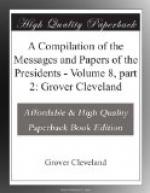Many of the calamitous effects of the tremendous revolution which has passed over the Southern States still remain. The immeasurable benefits which will surely follow, sooner or later, the hearty and generous acceptance of the legitimate results of that revolution have not yet been realized. Difficult and embarrassing questions meet us at the threshold of this subject. The people of those States are still impoverished, and the inestimable blessing of wise, honest, and peaceful local self-government is not fully enjoyed. Whatever difference of opinion may exist as to the cause of this condition of things, the fact is clear that in the progress of events the time has come when such government is the imperative necessity required by all the varied interests, public and private, of those States. But it must not be forgotten that only a local government which recognizes and maintains inviolate the rights of all is a true self-government.
With respect to the two distinct races whose peculiar relations to each other have brought upon us the deplorable complications and perplexities which exist in those States, it must be a government which guards the interests of both races carefully and equally. It must be a government which submits loyally and heartily to the Constitution and the laws—the laws of the nation and the laws of the States themselves—accepting and obeying faithfully the whole Constitution as it is.
Resting upon this sure and substantial foundation, the superstructure of beneficent local governments can be built up, and not otherwise. In furtherance of such obedience to the letter and the spirit of the Constitution, and in behalf of all that its attainment implies, all so-called party interests lose their apparent importance, and party lines may well be permitted to fade into insignificance. The question we have to consider for the immediate welfare of those States of the Union is the question of government or no government; of social order and all the peaceful industries and the happiness that belong to it, or a return to barbarism. It is a question in which every citizen of the nation is deeply interested, and with respect to which we ought not to be, in a partisan sense, either Republicans or Democrats, but fellow-citizens and fellow-men, to whom the interests of a common country and a common humanity are dear.
The sweeping revolution of the entire labor system of a large portion of our country and the advance of 4,000,000 people from a condition of servitude to that of citizenship, upon an equal footing with their former masters, could not occur without presenting problems of the gravest moment, to be dealt with by the emancipated race, by their former masters, and by the General Government, the author of the act of emancipation. That it was a wise, just, and providential act, fraught with good for all concerned, is now generally conceded throughout the country. That a moral obligation rests upon the National Government to employ its constitutional power and influence to establish the rights of the people it has emancipated, and to protect them in the enjoyment of those rights when they are infringed or assailed, is also generally admitted.




